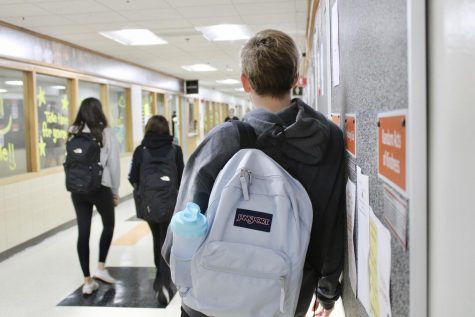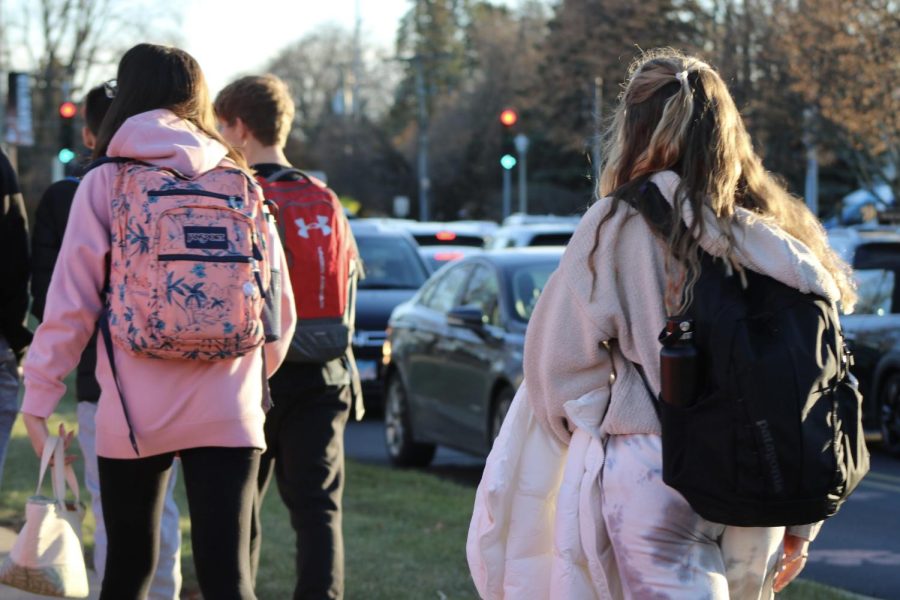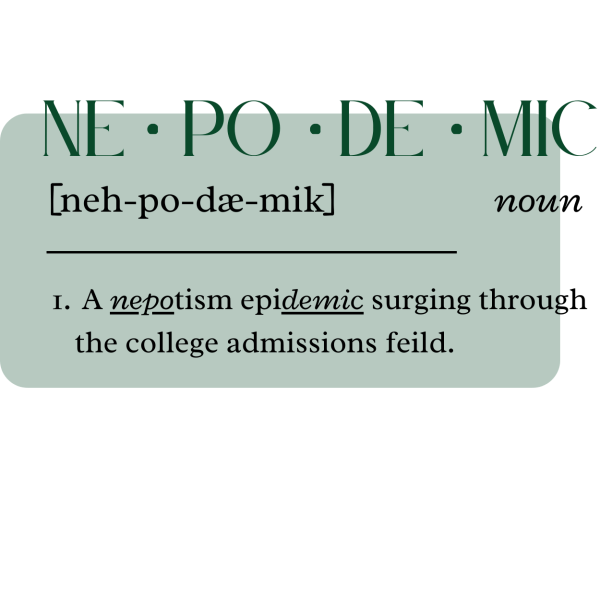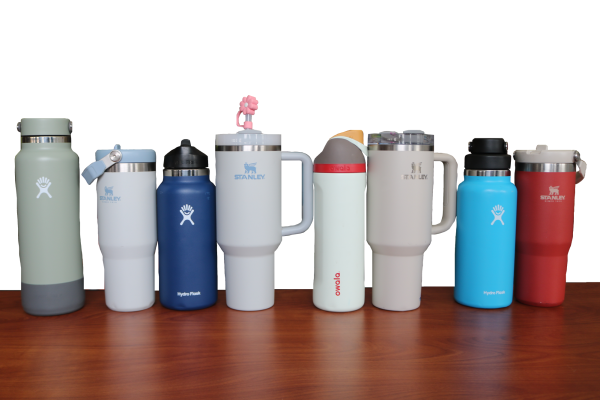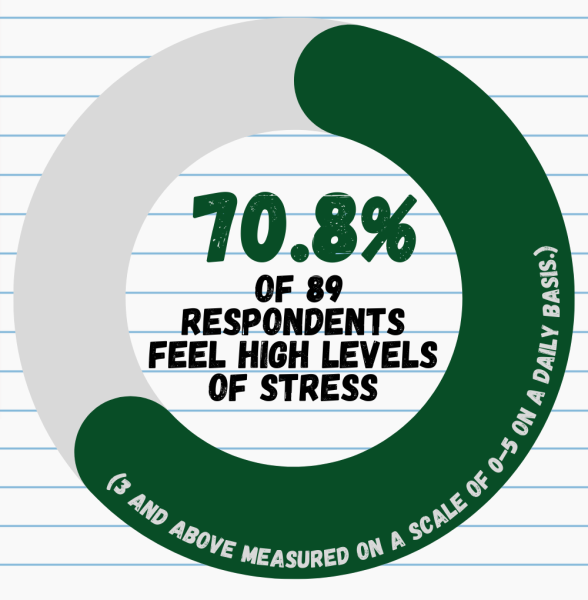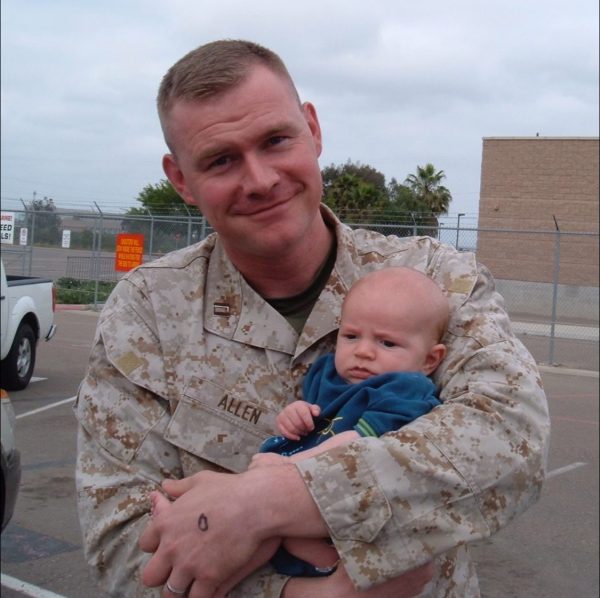Backpack Betrayal
Freshman hike home after a long day with heavy backpacks. According to experts, excess weight such as carrying a backpack for several hours a day can lead to mild health conditions later in life.
Summer is ending and the school year is starting! It’s time for shoes that will be worn out within a month, excessively expensive clothes, and piles upon piles of homework. Out of all this spending, new backpacks have always been a trend here at Libertyville High School. From kindergarten to high school, backpacks have always been a staple of organization and mobility in carrying our everyday things. Nowadays, we may as well carry our lives in our backpacks. But what if your backpack may not be as helpful as you think? Are backpacks doing more harm than good?
Here at LHS, we’re carrying around more baggage than ever before, and we’re not talking about the emotional weight of the trauma we’ve been enduring for the last two and a half years. We literally mean baggage: we’re lugging around heavy textbooks, folders and binders, and stuffing our lunch boxes and gym clothes wherever we can. We’re dumping more weight into our backpacks (and onto our backs) than ever before.
Dr. Koulentes expressed concern for the students carrying so much on their shoulders. “A lot of students actually have two backpacks. One for after-school activities and one for during the school day,” Koulentes said. “They wear one backpack on their back and one on their front. And I get concerned because the backpacks appear to be very heavy and students appear to wear them throughout the day.”
Many people may be thinking: “How bad can my backpack really be?” The thing is, backpacks are meant for carrying heavy luggage, but we have to be careful about what we put in our backpacks. When we put all our items in our bags for school, we often put things in there that we may not necessarily need. Over time, the strain caused by these items can lead to problems with the spine, and a new study illustrates just how easily it can happen.
A 2014 study, published by the National Library of Medicine, used MRIs to analyze how heavy backpacks affect the lower backs of kids feeling lower back pain and those who didn’t. As it turns out, the kids with previous pain and heavy backpack loads suffered from disc compression in their lower backs, which can lead to painful problems down the road.
Wearing a heavy backpack without the right straps or the correct fit can strain the shoulders, back, and neck. It only gets worse when the body tries to compensate for the extra weight, such as leaning forward. That compensation for all that weight can adopt positions such as an increased forward head posture and rounded shoulders that put the spine out of alignment. This can also cause the muscles within your shoulders to fatigue and start to weaken. This results in poor posture and a misaligned spine.
People who use heavy purses, suitcases, and wear their backpack to one shoulder are even more at risk to injury. Purses and those who carry their backpack shoulder strap on one side of a backpack place all the weight on one side, causing a bend or lean in an effort to compensate for the off-kilter weight. This can strain the shoulder and back, eventually causing injury and pain.
The longer someone carries the extra weight, the worse it gets. Over time, the extra weight can lead to the holder experiencing pain, stiffness, and problems with flexibility and range of motion. This can significantly increase potential injury. The effects may include an aching back, a sore or stiff neck & shoulders, and headaches.
“It takes a bit. You may not see it right away, but I can definitely see kids as they walk around. They look a little bit more hunched over, especially if their backpacks are really heavy, and I definitely see a lot of very, very heavy backpacks,” the school nurse Cameron Traut replied. “So it is concerning that over time, this is doing damage to their spine, causing possibly a lot of strain for sure, and possibly some curvature that you might see evidence of as their spine continues to develop because, as we know, adolescents are still developing both in their mind and their body. So there’s a real concern that the spine is developing and that this is not going to be healthy for your spine as you continue to grow.”
The good news is, there are plenty of ways to avoid giving yourself strain and stress that you don’t need. All you need to do is ask the simple question: “Do I really need that?” For now, the simplest way to avoid injury is to lighten the weight inside your backpack. If this doesn’t help, there are also a few other ways you can help to lighten the weight of your backpack.
A recommendation is you should make frequent stops to your locker, though this one may not be recommended for everyone since most lockers in the school are barely the size of a mini fridge. Also, some may not have access to their lockers, or they prefer not to use them. The hallways at LHS are sometimes too crowded, and it can sometimes take too long to stop between classes.
“I would encourage more students to utilize their lockers by making sure the lockers work [and] making sure they’re clean,” Dr. Koulentes said. “If a student’s locker is in a really inconvenient location for them, working with them to try to identify a better locker so that they could be more efficient in what they carry.”
Another recommendation is to rearrange your bags by putting heavier items closer to the body and at the bottom. This way, the weight of the backpack won’t be off-kilter and be able to be distributed correctly across your entire back. This can help regulate your spine by not having anything in the front of your backpack pockets that could weigh you down.
Regardless, if backpacks really are to blame for all the body problems at schools like LHS, then this problem needs to be addressed. You can encourage others to wear their backpacks properly and keep them light. Have them use both straps and make frequent stops at their locker throughout the day or lighten their weight to avoid carrying all their books at once. If people aren’t careful with how they use their backpacks, the consequences will be detrimental to your health. In the short term, students might notice aches and pains, but many won’t realize that backpacks could be to blame. Long term though, children and teens with back problems are more likely to become adults with back problems.
Man, all these problems from a 20-pound backpack. What a pain in the neck!
